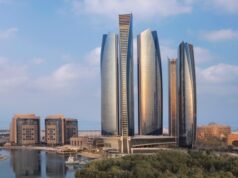
For the past several decades, the hotel and resort industry has made impressive shifts toward more environmentally friendly operational practices. Eliminating single-use shampoo bottles and asking guests to reuse towels and sheets are some of the basic and necessary steps hotels have taken to ensure a greener planet. While these measures have undoubtedly resulted in a smaller carbon footprint, according to the New Building Institute, they are still not enough.
The institute, which tracks net-zero buildings around the country, calls the hotel and resort industry’s record on energy and water consumption “lackluster.” It says this is due to several reasons, including the complicated ownership models and structures and concerns about improvements disrupting the guest experience.
Globally, hotels are responsible for about 1 percent of carbon emissions. The United Nations report on climate action says that if the planet is to stay within the 2°C threshold cited in the Paris Climate Accord by 2030, carbon levels will need to drop by 66 percent. Emissions will have to drop at least 90 percent by 2050.
Hotels and resorts know that carbon-free energy practices are not only good for the planet, they are also good for business. Sustainability practices have become a key differentiator for environmentally conscious tourists to choose one hotel over another. According to a report on the industry from the Urban Land Institute, 44 percent of guests younger than 25 say that it is vital to lower emissions and make operations more sustainable. In comparison, 33 percent of all 72,000 Hilton guests in the same survey said they would rather stay in a hotel with environmental and social programs.
While lowering the hotel’s carbon footprint has many hurdles, hotels must implement additional measures to move beyond basic sustainability practices and truly change sustainability standards.
Carbon-free 101
It is essential that hotel operators know the various options available to reduce fossil fuel consumption and start moving the needle on their carbon reduction goals. Carbon-free energy is produced by a resource that generates no carbon emissions, such as nuclear or large hydroelectric. Unfortunately, nuclear power makes radioactive waste, and hydro energy can negatively affect the environment by creating dams and reservoirs.
Renewable energy, on the other hand,is a naturally replenishing resource that has zero emissions. This National Geographic map shows how renewable energy sources like solar, wind, geothermal, biomass and biowaste, and hydroelectric currently power the world.
A carbon offset is another way to move toward a carbon-free future. Carbon offsets reduce emissions of carbon dioxide or other greenhouse gases made to compensate for emissions that are produced elsewhere. Organizations like Green-e offer carbon offset programs that are relatively easy for a hotel or resort to implement. The hotel estimates the amount of carbon generated by a guest’s hotel stay, then compensates for these emissions by funding projects (e.g., renewable energy, energy efficiency, reforestation, agriculture) that reduce greenhouse gas emissions elsewhere.
Sustainability experts recommend that hotels should first find ways to reduce greenhouse gas emissions within the hotel before buying carbon offsets. As a best practice, carbon offsets should complement but not replace internal efforts to reduce carbon output.
Another desirable way to reduce your carbon footprint is by purchasing energy upgrades such as renewable energy certificates (RECs). A REC is a production subsidy to electricity that is generated from renewable sources. In many cases, hotels can purchase RECs and electricity or RECs alone from any supplier (e.g., a wind farm) that supports green energy. For an easy-to-follow primer on RECs, read this comprehensive article.
Hotels can also nudge their trading partners toward a carbon-free supply chain by contacting suppliers to ask if they use carbon-free power. Hotels with a more aggressive stance on cutting carbon emissions can require their suppliers to report types of energy usage or even report a total annual carbon footprint, although that can be a cumbersome requirement. There are valuable industry resources, such as Green Lodging News, that can provide suppliers’ names that focus on providing carbon-free energy solutions or producing products with a low carbon footprint.
Finally, hotels should contact their local energy utility to learn about programs for wind, solar, nuclear, or other forms of carbon-free energy.
Internal Renewable Energy Sources
Internal renewable energy sources can make the greatest impact, which is why many hotels have recently begun implementing on-site solutions, such as solar panels. Yet as attractive as an on-premise solution may be, the reality is that some hotels may not be able to deploy internal renewable energy sources due to the hotel’s location, age, or rooftop size. For example, a hotel may only gain 10 percent of its energy usage due to limited space to put panels on. Online resources such as geospatial tools and Let’s Go Solar can tell you if your hotel is a good fit for solar.
Hoteliers say that one of the biggest downsides to solar energy is the expense. However, there are increasingly more government and utility programs that may offset installation costs. This website shows businesses how they can take advantage of solar panel incentives, rebates, and tax breaks to make solar more accessible.
Benchmarking Outcomes
To validate renewable energy practices and report outcomes to investors, major hotel brands use various management systems and apps to track their carbon reduction footprint progress. There are also several diagnostic tools that identify opportunities to install energy-saving technology—like LED lighting, room thermostats with occupancy sensors, and high-efficiency water fixtures—that can also provide measurable results and a good return on investment.
As more businesses embrace the green movement, they see that energy savings, health benefits, and creating better work environments for employees are a few of the benefits for embracing sustainable strategies. Several years ago, Meyers decided to set company-wide greenhouse gas reduction goals and take advantage of measures that could save energy and reduce operating costs. One goal is that Meyers will purchase all our electricity from carbon-free energy sources by the end of 2021. Our switch to using carbon-free electricity will be the equivalent of over 650 average American homes getting their electricity solely from solar and wind power.
Meyers has also installed a solar array on our headquarters’ roof to produce a portion of our carbon-free energy. We will purchase the remaining carbon-free electricity through Xcel Energy’s Renewable*Connect program, which provides electricity from wind and solar sources. This path allows us to fulfill our commitment to sustainability quickly and cost-effectively, without costing our clients a single penny to reduce their supply chain’s carbon footprint.
Our earth-friendly solutions also include sustainable signage and displays that use renewable plant-based products instead of plastics and traditional foamboard. The AssureCard is an RFID hotel key card that offers all the plastic key card’s best features—durability, convenience, and low cost—while providing a sustainable, plant-based alternative to traditional PVC plastic hotel key cards.
Businesses that embrace carbon-free or carbon-neutral practices have learned that significant investments can take more planning and cost more upfront, but they also yield far-reaching results. More than ever, hotels and resorts understand that sustainability is not just an aspirational endeavor. It is a reality that promises a stronger brand promise, more efficient operations, and a profitable business.
Michael Dillon is the Director of Marketing & Communications and a member of the Sustainability Committee at Meyers. His passion for environmental sustainability dates to the mid-2000’s, which lead him to write a thesis on the economics of renewable energy production, start bike commuting, and become lightly obsessed with sustainability technology. He is helping lead Meyers through several sustainability initiatives, including production of paper RFID key cards for the hospitality industry and a commitment to using only carbon-free electricity. As a premier print manufacturer and expert design studio, Meyers has been helping our clients and their brands stand out, attract new customers, and drive more sales since 1949. Meyers designs and manufactures product labeling, packaging, and retail merchandising solutions for consumer-packaged goods, as well as innovative paper cards, large-format graphics, and retail displays. The products Meyers creates can be found at virtually every retail outlet across the country. Meyers is also committed to environmental responsibility and is a proud supporter of the Forest Stewardship Council (FSC), the Sustainable Forestry Initiative (SFI) and Oceanic Global. To learn more, visit meyers.com or follow on LinkedIn and Twitter.







